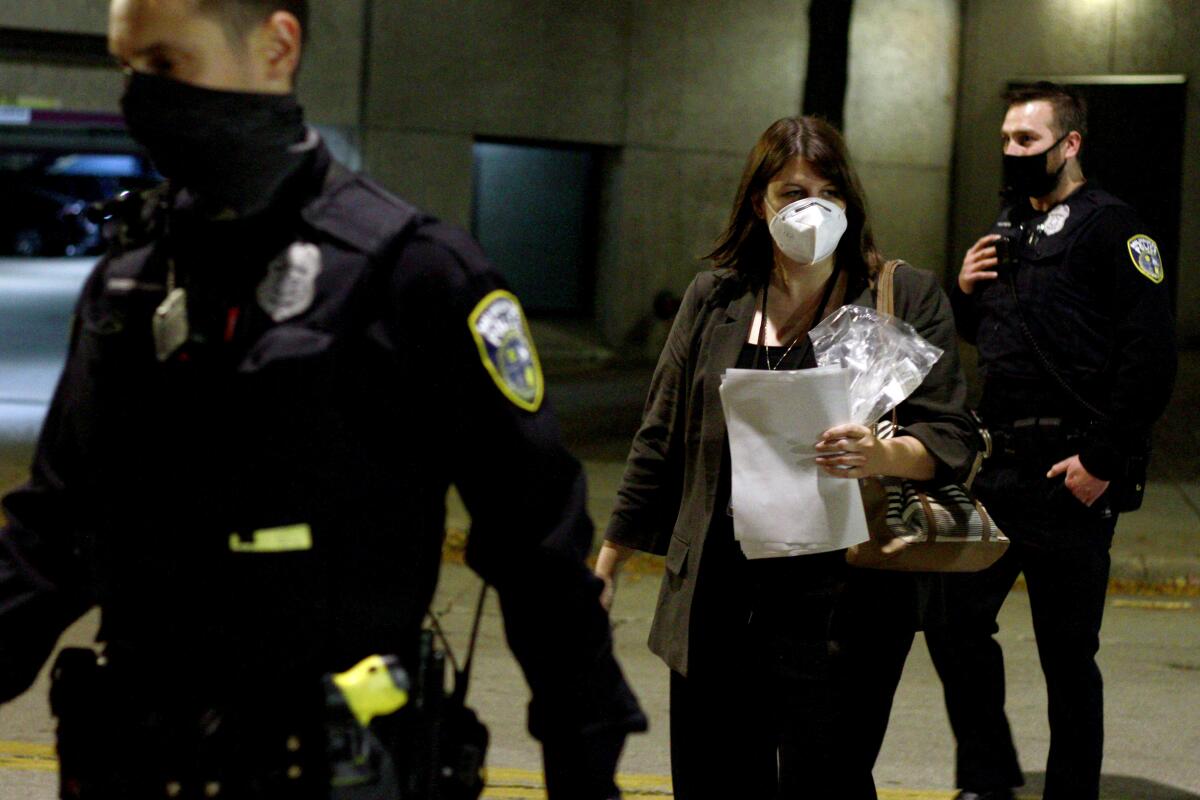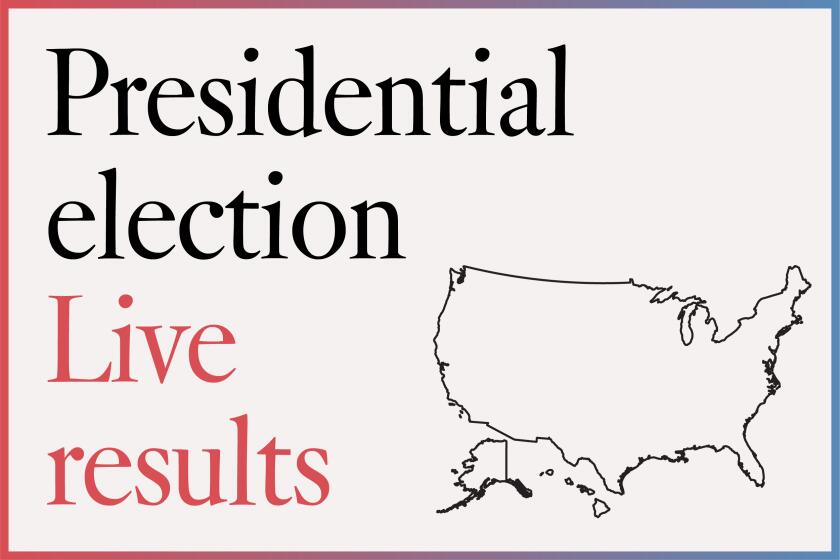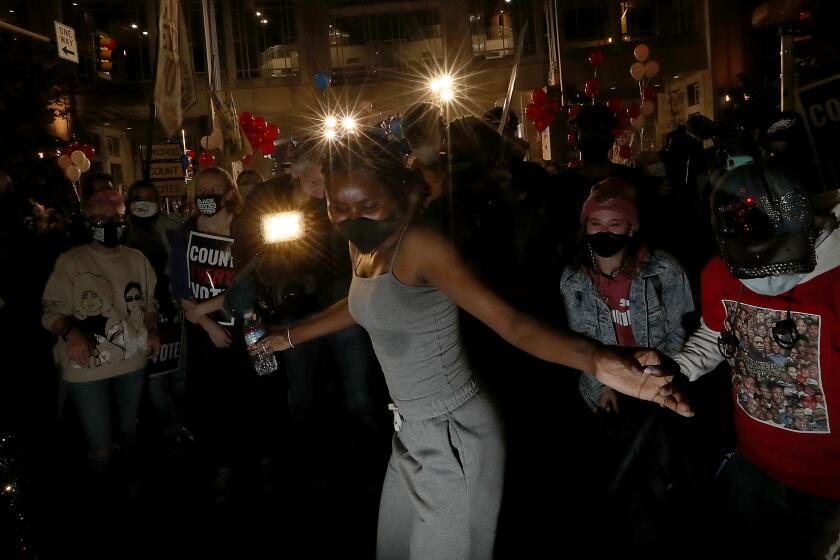Americans broke a 120-year-old turnout record — and are more divided than ever

- Share via
WASHINGTON — Americans turned out to vote in this year’s election as never before, and the result seemed only to deepen the trench dividing the two warring parties.
From Atlanta to Milwaukee to Phoenix, Joe Biden gained ground in suburban areas, widening his party’s advantage among voters who have turned away from President Trump. Biden’s margins were several points smaller than most preelection polls had predicted, but as the vote count continued Wednesday, he appeared to be winning most of the states that pollsters had projected.
At the same time, Republicans succeeded in finding and turning out unprecedented numbers of voters in more conservative rural and exurban parts of the country. That effort may not have been enough to save Trump’s reelection — the final outcome may not be known for several more days — but it did successfully stop the Democrats from expanding their control of state legislatures, blocked their shot at widening their majority in the House and probably saved the Republicans’ Senate majority.
As a result, if Biden does move into the White House, he seems likely to be the first Democrat to do so without full control of Congress since the late 19th century.
The opposing party mobilizations drove turnout to record levels: More than 160 million Americans voted, according to Michael McDonald of the University of Florida, whose U.S. Elections Project tracks voter turnout. That represented 66.9% of the potentially eligible voting population, McDonald said, the largest participation since 1900 and by far the biggest of the modern era.
“We broke a 120-year record on turnout — the kind of turnout people only dreamed of” in past elections, said political scientist Julia Azari of Marquette University in Milwaukee. But that massive turnout did not clearly establish one party as the dominant force in American politics. By some measures, “it didn’t change much,” she said.
Republicans remain hobbled by the way Trump’s character and policies turned off suburban voters and women, who voted heavily for Biden and other Democratic candidates — a point that one of the party’s most prominent leaders conceded Wednesday.
“I think we’re very much aware of the challenges that we have in suburbs across America,” Senate Majority Leader Mitch McConnell told reporters in his home state of Kentucky. “The other thing that’s been a Republican challenge, really for a number of years but particularly in recent years, is the gender gap,” he said.
Democrats faced a challenge of their own: Republicans managed to blunt Biden’s efforts to reach beyond his party’s base and broaden his appeal in red America by labeling him a stalking horse for a socialist party, said Elaine Kamarck, a Democratic National Committee member and scholar at the Brookings Institution in Washington.
Although preelection polls suggested that Biden would improve on Hillary Clinton’s showing among white, college-educated voters, the election data so far indicate that did not happen, said Democratic analyst Ruy Teixeira. Biden did win back some of the non-college-educated white voters that Clinton lost to Trump four years ago, but there, too, the gains were smaller than expected, Teixeira said.
For both parties, the results put a spotlight on internal tensions that could turn into divisive public fights in the year to come.
Republicans remain divided on whether, without the burden of Trump’s bombastic style, they can win back suburban voters who incline toward moderate policies or whether their future lies in a more explicit form of conservative populism aimed at working-class voters — Trumpism without Trump.
Democrats on Wednesday were already dividing over whether the problem of Biden’s campaign was too much moderation or too little.
In Kamarck’s view, “Biden tried to reach beyond his base, but his attempt was undercut by Democratic primaries where everybody but Biden and a handful of others were out on the left wing.”
A group of conservative Latinos are pushing for other Latinos to walk away from the Democratic Party.
“Biden did a good job trying to say, ‘I beat those guys in the primary.’ He knew he had to overcome that, but it was hard to overcome.”
Teixeira suggested that Biden might also have suffered among Latino voters because the attention paid this summer to issues of racial justice drowned out talk of his “working-class economic agenda” that might have connected more directly with many of them. “Maybe that’s not what the median Black or Latino voter wanted to hear” as the main topic of discussion, he said. “Maybe the culture wars are a loser for Democrats.”
Others within the party argued just the opposite — that a more leftist candidate would have been able to mobilize a larger number of young voters and people of color.
Mike Casca, spokesman for Sen. Bernie Sanders of Vermont, disputed the idea that the GOP’s “socialism attack” had an impact. President “Obama, who was called a socialist relentlessly by the right wing, won Florida twice,” he wrote on Twitter.
Democrats, Azari said, have tried to appeal to “disenfranchised and marginalized groups” but have been limited in doing so in part because they have also sought to portray themselves as the party of “reasonableness and relative moderation” in the Trump era.
“You can’t really do both those things” at the same time, she said.
Photos: Election day voting is over but the counting continues.
Exit polls and other surveys indicate that Biden did succeed in driving up the Democrats’ advantage among young voters. According to an election night poll by the Republican firm Public Opinion Strategies, Biden beat Trump by 42 percentage points among 18-to-29-year-olds, a huge gain over the 27-point edge Hillary Clinton enjoyed in 2016.
And the gender gap grew, as Biden more than doubled Clinton’s margin among women and even erased Trump’s 2016 edge among white women.
But Trump drew still more deeply into the enduring components of his base, building a crushing 67%-27% advantage among white men who did not graduate from college — a slightly larger margin than in 2016, the firm’s survey showed.
The survey also pointed to a possible reason that many preelection polls overstated Biden’s advantage — 19% of Trump voters said they had kept their support for the president a secret from most of their friends, compared to just 8% of Biden voters.
A political landscape like this — where Republicans are focused on driving up turnout from an older, white base that is a declining share of the population, while Democrats build support among young people and other growing parts of the electorate — carries risks for their party in the future, some Republicans worry.
Democratic presidential candidates have won more votes than the other side in seven of the last eight presidential elections — a streak of success unmatched in U.S. history, even though the structure of the electoral college has meant that two of the party’s candidates, Clinton and Al Gore, did not become president.
“I believe the Democratic Party has been far more successful at adjusting to the big changes in America and the world — globalization, changing demographics and the changing information climate,” said Simon Rosenberg, founder of the centrist New Democrats Network. “Republicans have been less successful at adapting to these changes and more reliant on gaming the system.”
But while Democrats believe their approach will succeed in the long run, political campaigns live in the short term. For now, although they may lose the presidency, Republicans believe they have averted a far worse defeat, and the prospect of compromise between the warring parties seems more distant than ever.
More to Read
Get the L.A. Times Politics newsletter
Deeply reported insights into legislation, politics and policy from Sacramento, Washington and beyond. In your inbox twice per week.
You may occasionally receive promotional content from the Los Angeles Times.















